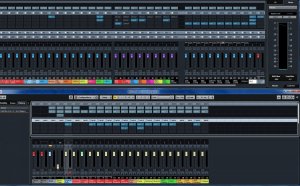Haakond
Active Member
Hi,
I needed to learn FMOD for a project I am working on, to implement music into a game. Learning the program was not that hard as I first thought, and this opens up a lot of possibilities for the soundtrack. And it certainly makes it easier to set a certain intro > loop > end in a more musical way than it would be for a programmer to do.
During my experiments with FMOD, I started wondering about two different things that maybe some of you know.
1. One of the advantages with a program like this is that you can use layers in the music, and for example throw in a choir when health is low. I do all composing, mixing and mastering in Logic and make a intro + loop + end file of each song. That means I bring in an already mastered track into FMOD. But if I want to separate different sections of the orchestra, does this means that I have to master each section by its own? Or would you bounce out each section into the mastering project, master it and then export each section again? If I have a low strings section playing an ostinato by itself and then fade in the rest of the strings into a different layer, the reverb from both sections would play on top of each other. And if you have many different layers, there would be a lot of extra reverb going on. Would this a problem?
I usually have front reverb for strings + piano, mid reverb for winds and horns, back reverb for rest of brass and perc, and a “glue” reverb for all the instruments
2.
Is it normal for composers to deal with the implementation in Unity/Unreal etc? Or is this a job for the devs? To me, it makes most sense that I don’t do anything in the game engine. But what do you guys do?
Thanks!
I needed to learn FMOD for a project I am working on, to implement music into a game. Learning the program was not that hard as I first thought, and this opens up a lot of possibilities for the soundtrack. And it certainly makes it easier to set a certain intro > loop > end in a more musical way than it would be for a programmer to do.
During my experiments with FMOD, I started wondering about two different things that maybe some of you know.
1. One of the advantages with a program like this is that you can use layers in the music, and for example throw in a choir when health is low. I do all composing, mixing and mastering in Logic and make a intro + loop + end file of each song. That means I bring in an already mastered track into FMOD. But if I want to separate different sections of the orchestra, does this means that I have to master each section by its own? Or would you bounce out each section into the mastering project, master it and then export each section again? If I have a low strings section playing an ostinato by itself and then fade in the rest of the strings into a different layer, the reverb from both sections would play on top of each other. And if you have many different layers, there would be a lot of extra reverb going on. Would this a problem?
I usually have front reverb for strings + piano, mid reverb for winds and horns, back reverb for rest of brass and perc, and a “glue” reverb for all the instruments
2.
Is it normal for composers to deal with the implementation in Unity/Unreal etc? Or is this a job for the devs? To me, it makes most sense that I don’t do anything in the game engine. But what do you guys do?
Thanks!




 Feel free to PM me (or ask here, just tag me so I don't miss it) if you want any clarification!
Feel free to PM me (or ask here, just tag me so I don't miss it) if you want any clarification! I never heard about composer who would do audio implementation especially in game engine itself. Except if composer is also sound engineer who is hired to take care on entire project. But then salary is way different because in engine implementation (oreven in FMOD/Wwise) require extensive knowledge about engine's language (c#, c++ or sometimes just blueprints for UE4). And if it's job for Ubisoft then also knowledge about graphics 3D software is also "good to have"
I never heard about composer who would do audio implementation especially in game engine itself. Except if composer is also sound engineer who is hired to take care on entire project. But then salary is way different because in engine implementation (oreven in FMOD/Wwise) require extensive knowledge about engine's language (c#, c++ or sometimes just blueprints for UE4). And if it's job for Ubisoft then also knowledge about graphics 3D software is also "good to have" 
